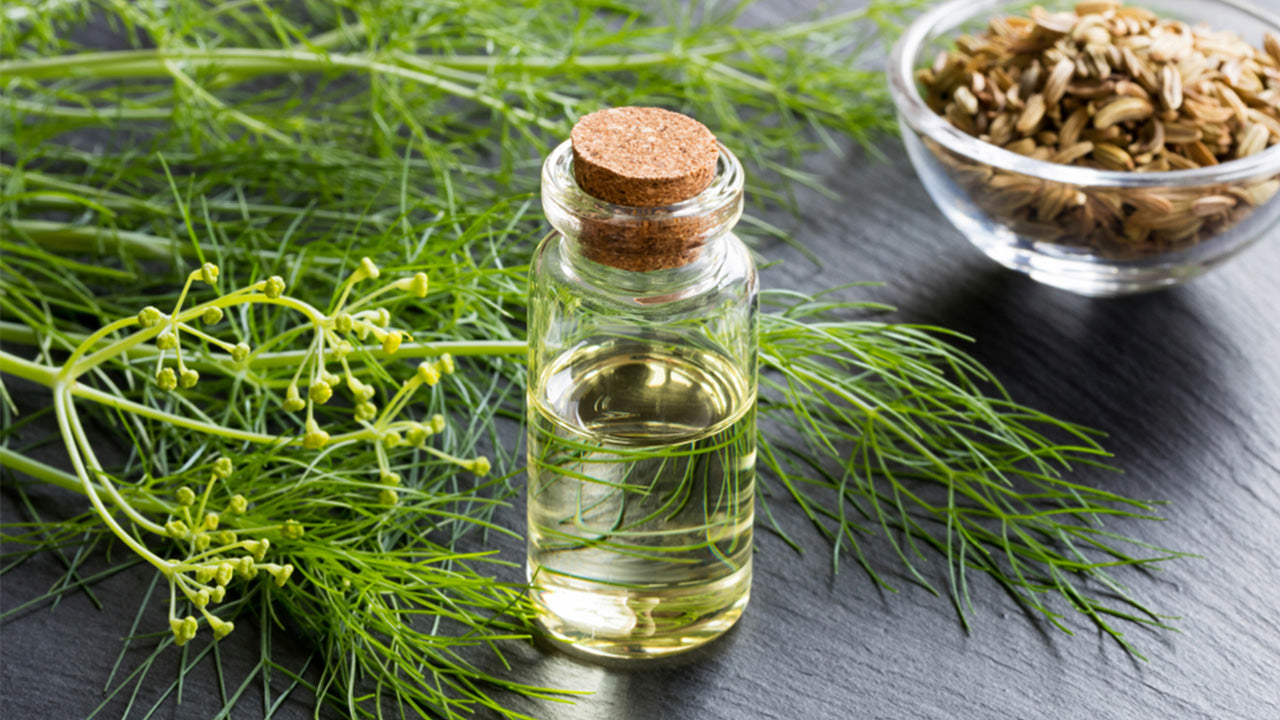Fennel Essential Oil Benefits and 7 Fennel Essential Oil Uses
 By: by Amino Science
By: by Amino Science

Indigenous to the Mediterranean, fennel is grown the world over and celebrated in recipes and for its medicinal properties. It’s a hardy herb with a large white bulb and green fronds. Related to carrots, fennel is commonly used in Italian recipes—it gives Italian sausage its unique flavor. The bulb, seeds, fronds, and pollen are edible and used in many culinary applications, but fennel essential oil is made from fennel seeds.
What Is Fennel Essential Oil?
Distilled from the seeds of the fennel plant, fennel essential oil has a slightly spicy flavor with a hint of earthy herbaceousness. Sweet fennel oil definitely tastes of anise or licorice, a taste that is not pleasing to everyone.
Fennel essential oil has been used for thousands of years in ancient medicinal practices by the Chinese, Romans, and Egyptians. It is most widely recognized for its ability to soothe upset stomachs and relieve gas and bloating.
This powerful essential oil demonstrates strong antiseptic properties and when diffused it can stimulate the brain. Sweet fennel oil can be applied topically to wounds, added to massage oils and bathwater, diffused, or used in recipes.
Fennel and Fennel Oil Facts
- Fennel is a perennial plant that produces fragrant yellow flowers.
- Fennel is related to parsley, carrot, cumin, dill, anise, and caraway.
- In Ancient China, it was used as a snake bite remedy.
- Fresh fennel has a crunchy texture and a slightly sweet flavor of anise or licorice.
- The entire fennel plant is edible, including the seeds, bulb, stalk, pollen, and leaves (or fronds).
- Fennel essential oil is made by capturing the steam from the distillation process of the ripe fennel seeds.
Fennel Essential Oil Benefits
1. Fights Oxidative Stress and Inflammation
In a recent study published in the Pakistan Journal of Biological Sciences, scientists have identified that both rosemary essential oil and fennel essential oil show cardioprotective properties and hepatoprotective properties and they both fight oxidative stress. The researchers note that fennel essential is more efficient at fighting inflammation than rosemary oil.
2. Improves Irritable Bowel Syndrome Symptoms
A 2018 clinical study published in the peer-reviewed journal Annals of Gastroenterology, has found that a combination of fennel essential oil and turmeric improves symptoms of IBS in two months and significantly augments quality of life scores in patients with irritable bowel syndrome.
3. Demonstrates Antifungal Activity Against Candida
Researchers from Brazil have identified that a variety of essential oils from dill, cumin, anise, and fennel effectively fight and inhibit antifungal activity in the mouth. The study published in the Brazilian Journal of Biology noted that cumin demonstrated the least activity against yeast infections, including candida of the mouth.
4. Fights Colic in Infants
Fennel seed oil relieves colic symptoms according to a randomized placebo-controlled study published in the journal Alternative Therapies in Health and Medicine. The fennel oil reduced intestinal spasms but didn’t cause side effects, and performed superior to the placebo head-to-head.
5. Relieves Digestive Distress (Including Bloating and Gas)
Fennel helps to relieve gas and bloating because it acts as an antispasmodic compound in the colon. It has been historically used in ancient medicinal practices for a variety of digestive issues because of its carminative properties. Fennel essential oil also acts as a laxative and diuretic.
6. Supports Weight Loss
According to Dr. Eddy Betterman MD, fennel seed essential oil can boost metabolism and suppress the appetite. Dr. Betterman also notes that fennel may help to break up fat deposits to be used as energy. When combined with an essential amino acid supplement, this fat-burning ability may be even further amplified.
Fennel Essential Oil Uses
1. Aromatherapy Oil for Appetite Suppression
Diffuse fennel essential oil to suppress your appetite. An animal study from Korean researchers found that inhaling fennel essential oil and patchouli essential oil impacts appetite, while bergamot essential oil does not.
2. Wound Therapy
Apply a couple of drops of fennel essential oil to a wound to speed healing and protect against infection.
3. Improve Focus
Diffuse a few drops of fennel essential to instill mental clarity and focus.
4. Ease Menstrual Pain Discomfort
Mix a few drops of fennel essential oil with a carrier oil like coconut oil and rub into your abdomen to relieve menstrual cramping and discomfort.
5. Natural Cuticle Treatment
If you have dry or cracked cuticles, mix coconut oil, almond oil, and five drops of fennel essential oil together and rub into your cuticles a couple times a day.
6. Culinary Uses
When researching fennel essential oil recipes note that this is an incredibly potent and powerful oil. A little goes a very long way and imparts a strong flavor. In recipes that call for fresh fennel or dried fennel seeds, you can boost the anise flavor by adding fennel essential oil. However, start with a drop or less and add more to taste.
Before consuming fennel essential oil be sure to read the precautions and warnings below.
7. Prevent Flatulence
The next time you prepare a dish that causes flatulence, swirl less than one drop into the dish before serving. This will add flavor but it may also prevent gas. Try it the next time you make hummus, white bean dip, or even high-fiber salads or cereals that typically cause you digestive upset.
If you don’t care for the anise flavor of sweet fennel essential oil, you can mix a few drops into a carrier oil and massage into your stomach and to the soles of your feet to relieve digestive distress such as flatulence, bloating, and cramping.
8. Support Lactation
Fennel essential oil for breastfeeding is commonly reported to spur healthy lactation. However, consuming fennel tea or fennel essential oil is not recommended for breastfeeding moms, as there are reports of nervous system damage to infants whose moms drank tea that contained fennel.
Instead of ingesting fennel or fennel essential oil apply it to the lymph node areas and around the breasts. However, it is important not to apply fennel essential oil immediately before breastfeeding, to the nipple, or to the areas surrounding the nipple where the baby can come in contact with it.
How to Choose Fennel Essential Oil
There are several high-quality brands to choose from, including the fennel essential oil from Young Living, doTERRA, and others. Preferably select a certified organic fennel essential oil and note that most reputable brands market it as sweet fennel or fennel (sweet) oil.
Purchase essential oils from a reputable source. Beware of online sales that offer too-good-to-be-true pricing.
Fennel Essential Oil Precautions and Warnings
Fennel essential oil is generally considered safe for healthy adults. However, fennel essential oil can cause severe interactions with certain medications and boost estrogen production.
Avoid fennel essential oil if you have hormone-sensitive or estrogen-sensitive conditions including:
- Breast cancer
- Uterine cancer
- Uterine tumors or fibroids
- Ovarian cancer
- Endometriosis
Avoid fennel essential oil if you are allergic to:
- Celery
- Mugwort
- Carrots
There are risks associated with fennel essential oil and breastfeeding.
Avoid fennel essential oil if you have a bleeding disorder or take blood thinners.
Fennel essential oil can interact with:
- Birth control pills containing estrogen
- The antibiotic Cipro (ciprofloxacin)
- Estrogen therapy
- Tamoxifen (Nolvadex) used to treat and prevent estrogen-sensitive cancers

Up to 25% off Amino
Shop NowTAGS: natural cures
Join the Community
Comments (0)
Most Craveable Recipes




 833-264-6620
833-264-6620




















